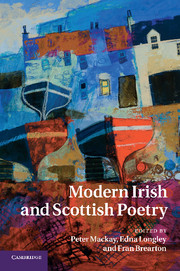Book contents
- Frontmatter
- Contents
- List of contributors
- Acknowledgements
- Introduction
- 1 Swordsmen: W. B. Yeats and Hugh MacDiarmid
- 2 Tradition and the individual editor: Professor Grierson, modernism and national poetics
- 3 Louis MacNeice among the islands
- 4 Townland, desert, cave: Irish and Scottish Second World War poetry
- 5 Affinities in time and space: reading the Gaelic poetry of Ireland and Scotland
- 6 Contemporary affinities
- 7 The Classics in modern Scottish and Irish poetry
- 8 Translating Beowulf: Edwin Morgan and Seamus Heaney
- 9 Reading in the gutters
- 10 ‘What matters is the yeast’: ‘foreignising’ Gaelic poetry
- 11 Outside English: Irish and Scottish poets in the East
- 12 Names for nameless things: the poetics of place names
- 13 Desire lines: mapping the city in contemporary Belfast and Glasgow poetry
- 14 ‘The ugly burds without wings’?: reactions to tradition since the 1960s
- 15 ‘And cannot say / and cannot say’: Richard Price, Randolph Healy and the dialogue of the deaf
- 16 On ‘The Friendship of Young Poets’: Douglas Dunn, Michael Longley and Derek Mahon
- 17 ‘No misprints in this work’: the poetic ‘translations’ of Medbh McGuckian and Frank Kuppner
- 18 Phoenix or dead crow? Irish and Scottish poetry magazines, 1945–2000
- 19 Outwith the Pale: Irish–Scottish studies as an act of translation
- Guide to further reading
- Index
- References
13 - Desire lines: mapping the city in contemporary Belfast and Glasgow poetry
Published online by Cambridge University Press: 18 April 2011
- Frontmatter
- Contents
- List of contributors
- Acknowledgements
- Introduction
- 1 Swordsmen: W. B. Yeats and Hugh MacDiarmid
- 2 Tradition and the individual editor: Professor Grierson, modernism and national poetics
- 3 Louis MacNeice among the islands
- 4 Townland, desert, cave: Irish and Scottish Second World War poetry
- 5 Affinities in time and space: reading the Gaelic poetry of Ireland and Scotland
- 6 Contemporary affinities
- 7 The Classics in modern Scottish and Irish poetry
- 8 Translating Beowulf: Edwin Morgan and Seamus Heaney
- 9 Reading in the gutters
- 10 ‘What matters is the yeast’: ‘foreignising’ Gaelic poetry
- 11 Outside English: Irish and Scottish poets in the East
- 12 Names for nameless things: the poetics of place names
- 13 Desire lines: mapping the city in contemporary Belfast and Glasgow poetry
- 14 ‘The ugly burds without wings’?: reactions to tradition since the 1960s
- 15 ‘And cannot say / and cannot say’: Richard Price, Randolph Healy and the dialogue of the deaf
- 16 On ‘The Friendship of Young Poets’: Douglas Dunn, Michael Longley and Derek Mahon
- 17 ‘No misprints in this work’: the poetic ‘translations’ of Medbh McGuckian and Frank Kuppner
- 18 Phoenix or dead crow? Irish and Scottish poetry magazines, 1945–2000
- 19 Outwith the Pale: Irish–Scottish studies as an act of translation
- Guide to further reading
- Index
- References
Summary
In his classic nineteenth-century expression of national sentiment, ‘The Library of Ireland’, Thomas Davis grounded his own sense of nationality in the elemental, organic and stable:
This country of ours is no sandbank, thrown up by some recent caprice of earth. It is an ancient land, honoured in the archives of civilisation, traceable into antiquity by its piety, its valour and its sufferings. Every great European race has sent its stream to the river of the Irish mind.
The Irish nation, Davis insists, is no mere sandbank but the ancestral site of an unyielding, natural continuity. Therein land and history organically suture one another. This kind of binding of place to identity and history in acts of natural union has tended to predominate all the way through to the present in Irish poetry, when the land is claimed via pastoral modes as the foundational realm of the national self. Seamus Heaney's landscape poetry is a canonical example of these processes, especially through Wintering Out and into North, given his effort to ‘politicize the terrain’ of his earlier collections. Hence, poems such as ‘Gifts of Rain’, ‘Anahorish’ and ‘Broagh’ open up the familial belonging of the parish in his earlier work to a wider communal territorial claim in which language, self and place cohere in establishing an identity that not only founds itself but also excludes those deemed outsiders or others. In ‘Gifts of Rain’ language and landscape entwine in natural identity: ‘The tawny guttural water / spells itself: Moyola.’
- Type
- Chapter
- Information
- Modern Irish and Scottish Poetry , pp. 222 - 237Publisher: Cambridge University PressPrint publication year: 2011
References
- 1
- Cited by



